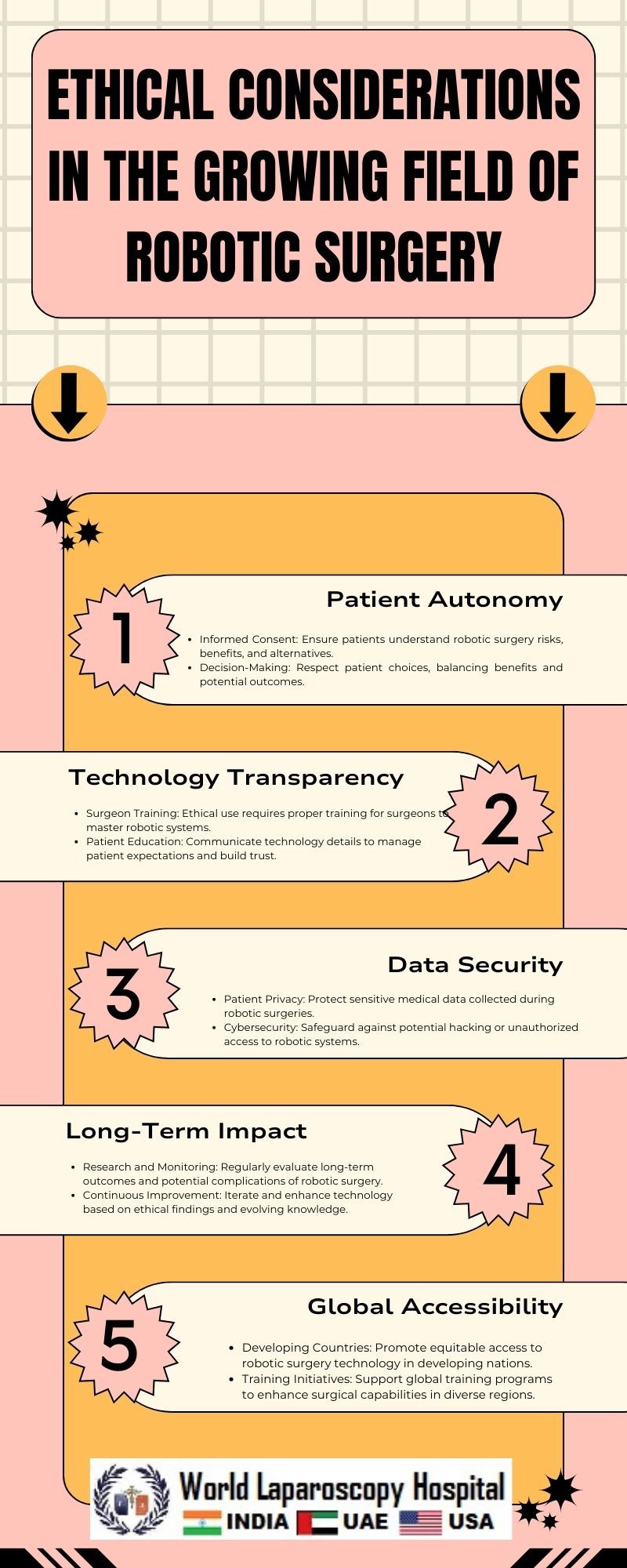Ethical Considerations in the Growing Field of Robotic Surgery
Introduction
The realm of medicine has witnessed an unprecedented transformation with the integration of robotics into surgical procedures. Robotic surgery, often hailed as a breakthrough in medical technology, has significantly advanced the precision and efficacy of various procedures. However, as the field continues to burgeon, it becomes imperative to scrutinize the ethical considerations that accompany this technological evolution. In this article, we delve into the multifaceted landscape of robotic surgery, exploring ethical dilemmas, patient autonomy, privacy concerns, and the overall impact on healthcare.

Enhanced Precision vs. Ethical Dilemmas
Robotic surgery has undeniably revolutionized the precision and accuracy of surgical procedures. The ability of robotic systems to provide three-dimensional magnification and intricate maneuverability has resulted in improved outcomes and reduced recovery times for patients. However, the ethical implications of relying on machines to perform delicate surgeries raise pertinent questions.
Surgeon Autonomy and Responsibility
One of the central ethical considerations in robotic surgery revolves around the degree of autonomy granted to the surgeon. As machines become more sophisticated, there is a risk of overreliance on automation, potentially diminishing the surgeon's role to that of a mere overseer. Striking a balance between harnessing technology for precision and maintaining the surgeon's responsibility is crucial.
Accountability for Errors
With the integration of artificial intelligence and robotic systems, the question of accountability in case of errors or malfunctions arises. Who bears responsibility when a robotic system makes a mistake during surgery? Should it be the surgeon, the manufacturer, or a combination of both? Establishing a framework for accountability is essential to ensure that patient safety remains paramount.
Patient Autonomy in Decision-Making
While robotic surgery offers promising benefits, ethical considerations must extend to the patients' rights and choices. Patient autonomy, a cornerstone of medical ethics, faces new challenges in the context of robotic procedures.
Informed Consent in the Digital Age
Obtaining informed consent is a fundamental ethical principle in healthcare. However, with the complexity of robotic surgery, ensuring that patients fully understand the nuances of the procedure becomes more challenging. Clear communication between surgeons and patients is essential to guarantee informed decision-making, particularly when intricate technologies are involved.
Alternative Treatment Options
Patients must be made aware of alternative treatment options and the associated risks and benefits. Robotic surgery should not overshadow traditional methods if they remain viable and ethical alternatives. Striking a balance between technological advancements and preserving a patient's right to choose requires careful consideration.
Privacy Concerns and Data Security
As robotics in surgery becomes more integrated with digital systems, concerns regarding patient privacy and data security come to the forefront. The collection and utilization of patient data raise ethical dilemmas that necessitate careful attention.
Data Ownership and Consent
Who owns the data generated during a robotic surgery procedure? Is it the patient, the healthcare institution, or the technology provider? Establishing clear guidelines on data ownership and obtaining explicit consent for its use is imperative to prevent the unauthorized sharing or exploitation of sensitive information.
Cybersecurity Risks
The convergence of robotics and digital systems exposes the field of robotic surgery to cybersecurity threats. Malicious attacks on robotic surgical systems could compromise patient safety and privacy. Ethical considerations must extend to implementing robust cybersecurity measures and ensuring the resilience of these systems against potential breaches.
Healthcare Inequality and Access
The adoption of robotic surgery introduces new dimensions to existing healthcare disparities. Ethical considerations in this context encompass equitable access to advanced technologies and addressing potential exacerbations of existing inequalities.
Economic Disparities
The high cost of acquiring and maintaining robotic surgical systems raises concerns about accessibility for patients across different socioeconomic strata. Ethical frameworks should be developed to address economic disparities and ensure that technological advancements benefit all segments of the population.
Training and Skill Disparities
The proficiency required to operate robotic surgical systems may lead to skill disparities among healthcare professionals. Ensuring comprehensive training opportunities for surgeons from diverse backgrounds is essential to prevent a scenario where only a select few have access to and expertise in robotic surgery.
Conclusion
As robotic surgery continues to reshape the landscape of healthcare, ethical considerations must remain at the forefront of technological advancements. Balancing the benefits of enhanced precision with the preservation of patient autonomy, addressing privacy concerns, and mitigating healthcare inequalities are pivotal to ensuring that the field evolves ethically and for the greater good of humanity.



